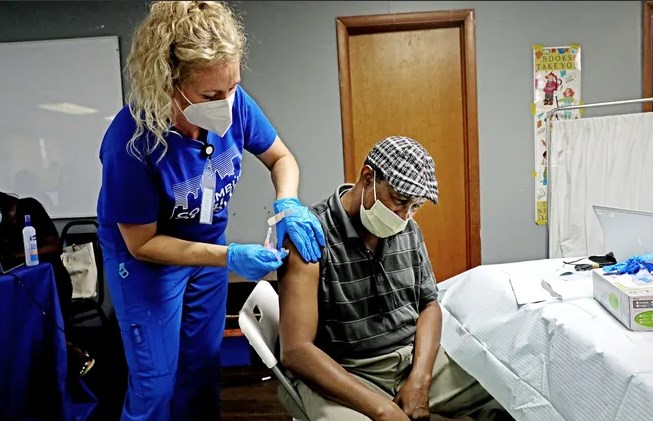
Saturday August 28, 2021

For months, Mohamed Olow was not sure if the COVID-19 vaccine was safe. The 63-year-old Somali man lives on Columbus’ North Side, where a large Somali population resides.
Like many of his neighbors, he was subject to misinformation about the pandemic that often spreads rapidly in a close-knit community.
Good friends have warned Olow that the vaccines might lead to damaging side effects. Having seen both the high COVID-19 death toll on the news and those around him getting sick from the virus, however, he recently decided that it was time for him to get his shots.
“I read the news, and I saw a lot of people who refuse to take the shots die,” said Olow, who works as a truck driver. “I tell my friends that the vaccine is safe, and they should get it to protect themselves. But some people still have doubts.”
Currently, more than 5.5 million people in Ohio are fully vaccinated, according to statistics from the Ohio Department of Health. But, similar to the national trend, Black Ohioans have a lower vaccination rate of 32%, compared with the statewide average of 48%.
The numbers are even lower for Somalis. Advocates estimate that less than 20% of the city’s Somali population is vaccinated. Rampant misinformation, cultural considerations and language barriers have all contributed to a high level of hesitancy, they said.
To overcome these barriers, Columbus Public Health set up seven pop-up clinics at mosques and local organizations across the city to provide vaccination services to residents. One of them is the Somali Community Association of Ohio (SCAO), a local nonprofit on the North Side where Olow received his second Pfizer dose on Wednesday.
Since the group started working with the city in early July, it has hosted eight weekly vaccination events and provided shots to more than 1,000 people, according to Hibo Noor, the health program manager at Columbus Public Health’s Office of Minority Health.
The goal of the partnership is to meet residents where they are, she said.
“We know that if we send the Somali people Downtown, transportation is going to be a major barrier,” Noor said. “The center is so close to the community. It’s within walking distance for many people. And everyone knows about it.”
Misinformation and barriers to vaccination affect Somali population
Similar to many other groups, misconceptions about COVID-19 vaccination and distrust toward the government have caused significant hesitancy within the Somali population, according to advocates.
Some falsely believe that getting the shot will lead to infertility, they explained. Others are worried that the vaccines might contain pork products, which is not permitted by their faith. There also are claims circulating that healthcare providers will implant them with a microchip or alter their DNA in the process.
The erroneous belief that COVID-19 vaccination will hurt one’s reproductive system has been particularly damaging to Somalis, according to Laura Berger Abbas. She is the chief operating officer of Our Helpers, a North Side community group serving Somalis and other immigrants.
“You have to think about the span of when a woman has children in a Somali population. It's from very young to almost menopause,” Berger Abbas said. “They don't want to mess that up in any way. Even if they've had children, they will not get the shots.”
Noor added that young people have been especially affected because of their exposure to misinformation campaigns on social media, which sometimes target Somali residents by creating materials in their native language.
Also, practical challenges such as transportation and many Somalis’ lack of English fluency have deterred them from seeking immunization, according to Mohamed Ali, a volunteer with Columbus Public Health.
In the past few months, Ali has been helping Somalis handle the logistics of registering for vaccination. Many of them do not have an email address, have trouble accessing technology, or could not understand the English questionnaires required for registration, he said.
“They just need a little help navigating the system,” Ali said.
A 'word of mouth' community
In the Somali community, people rely on word of mouth for information and often look to each other when making decisions, according to Hassan Omar, founder and president of the Somali Community Association of Ohio.
“Normally, the whole community will know if something happens,” Omar said. “So you meet 10 people, and you share the information. It spreads like fire.”
This means that misconceptions circulate widely, he said. But it also means that people likely will seek proper healthcare when they see others doing the same.
Omar Issak, a 43-year-old Somali man living in Westerville since 2008, got his first Pfizer dose at the Somali Community Association of Ohio on Wednesday. He spent the past few months in Somalia and headed to the clinic as soon as he came back.
“I see so many around me taking the vaccine now –– my brother, my mother, my neighbors," Issak said. "This is why I never listen to people saying the vaccine is bad.”
Omar said he hopes setting up a clinic in close proximity to Somali residents will show them that the community is standing behind the vaccines.
“We lost about 35 Somalis here in Columbus from COVID-19,” he said. “They know that. They are realizing that it’s really important to get the shots. Our center is within walking distance, and it’s a well-known organization so they feel comfortable coming to us.”